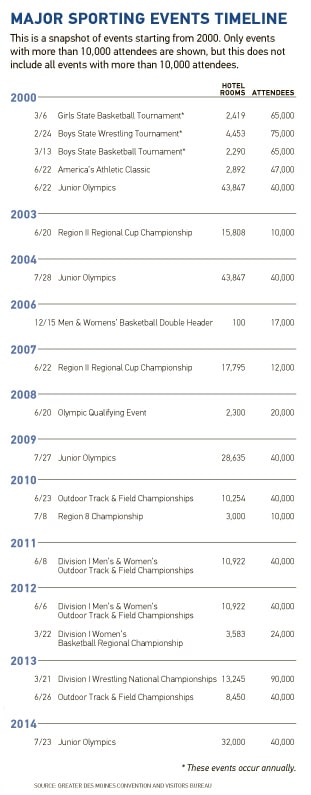Eye on the ball
Des Moines pushes the tempo on drawing big-time athletic events

Des Moines might never be able to host the Super Bowl or an NCAA Men’s Final Four basketball game, but that doesn’t mean the city is just sitting on the sidelines. In recent years, the Greater Des Moines Convention and Visitors Bureau (GDMCVB) and the Des Moines Area Sports Commission have increased their efforts to bring large sporting events to the area – and it’s paying off.
Large athletic events leave behind an equally large economic impact. Athletes, coaches and fans bring in new dollars to local businesses that can create jobs in the hotel, retail and restaurant industries.
In 2011 alone, Greater Des Moines hosted 420 events, and the GDMCVB and the Sports Commission estimate an economic impact of $45 million from the events it assisted with in fiscal year 2010-2011. Since 2000, the GDMCVB estimates that Des Moines has seen a $200 million economic impact from these type of events.
Greg Edwards, president and CEO of the GDMCVB, said the group made a conscious effort back in 2000 to dedicate more time and resources to bringing in these types of events. Their efforts are paying off. Over the years, the number of events with 10,000 or more attendees coming to town has steadily increased.
“But there’s also quality of life reasons,” Edwards said. “It gives residents here bragging rights and it gives them something to do.”
For the past several years, the organization has been booking larger, higher profile events such as the regional rounds of the NCAA Division I Women’s Basketball Championship, which it hosted last March.
The Des Moines’ regional tournament led all other regions in ticket sales, selling about 17,000 tickets in total. The weekend games had an estimated $2 million economic impact on Greater Des Moines.
Next year, the city will host the NCAA Division I Wrestling Championship, and the event is already drawing big expectations. When tickets went on sale on March 15 available tickets sold out in 14 minutes.
This year’s sold-out event in St. Louis brought in an estimated 110,000 attendees and had a $14.7 million economic impact on the region, according to the St. Louis Business Journal.
Edwards and Vice President of Sports and Development Mark Kostek can attest to the event’s enormity. The two attended the tournament and Edwards said the Hard Rock Café ran out of draft beer the evening before it kicked off.

But booking a sporting event can be as competitive as the event itself.
“You’re always competing against other communities.” Edwards said. “But what makes Des Moines special is that we have a really great understanding and feel of who we are and what we do well.”
When choosing a location, event organizers consider the city’s facilities and infrastructure, the history of past events, how the event will appear to a national audience, and community support – both corporate and volunteer.
They also look at the overall community, and consider factors such as the proximity between hotels and event space, what kind of transportation is available and where the airport is located, Edwards said.
The close proximity among the hotels, event space and airport is often a selling point for Des Moines, Kostek said, pointing out that even in the suburbs, guests are not too far away from sporting facilities.
Before being considered as an event-city host, the aforementioned information must be submitted to the event’s national governing body, such as the National Collegiate Athletic Association (NCAA), University Aviation Association (UAA) and the National Junior College Athletic Association (NJCAA).
“They have this whole checklist to go through to even see if we’re a viable candidate or bidder,” Kostek said. “It sounds cliché, but we have to get the community’s ducks in a row.”
If it’s decided that Des Moines and its infrastructure and facilities are a proper fit, the GDMCVB then begins planning the event, which generally takes between 12 and 18 months.
“We have the advantage of working as an entire region,” Edwards said. “We’re not fragmented like many other cities.”
Working together is important because it makes Des Moines a stronger contender. For instance, the solid partnership between the GDMCVB and Drake University has been a key factor in luring prominent track and field events to Des Moines because of the success and respect of the Drake Relays.
The groups have hosted events such as the USA Track & Field Championships, the NCAA Division I Outdoor Track & Field Championships and the AAU Outdoor Track & Field Championships.
Brian Brown, director of the Drake Relays, said being unified was a big strength for the region and described the relationship between the two organizations as healthy, saying the two equally lean and depend on one another.
Helping lead to the recent boom in sporting events was the construction of Wells Fargo Arena in 2005 and the $15 million expansion of Drake Stadium in 2006, both of which have given the city even more appeal.
Brown pointed out that Drake has hosted a major track and field event every year since the 2006 expansion – a feat that helped Central Iowa earn a reputation as being “Track Central.”
It appears the streak will continue: Des Moines will host the USA Outdoor Track & Field Championships again in 2013 after a successful run in 2010.
“We are bringing the USA Outdoor Track & Field Championships back to Des Moines to capitalize on the track and field interest that is already present in the community,” said Mike McNees, USA Track & Field interim CEO. “The Greater Des Moines Convention and Visitors Bureau, the Des Moines Area Sports Commission and Drake University have all been wonderful partners in the past, and we look forward to working closely with them over the coming year.”
“We need the community to embrace this event and support our athletes as they return from the Olympic Games and look to qualify for the 2013 World Championships,” he said.
But it’s not only Wells Fargo and Drake University that the group relies on. Venues such as the Cownie Soccer Complex, the Prairie RidgeSports Complex and various baseball fields are important as well.
“So many things that we do depend on facilities,” Edwards said. “All those things really help us go out and find groups.”
But even with a larger assortment of venues available now than a decade ago, Edwards and Kostek have a lengthy wish list of additional facilities they’d like to see in Des Moines.
Rounding out their list are items including more soccer and baseball fields, a 50-meter pool and a cross country course.
A second expansion that would add a large indoor warm-up facility to Drake Stadium also landed on their list, and Brown said a capital campaign led by Drake is already underway.
These items may be ambitious, but they’re also realistic enough to try and tackle, Edwards said.
“We know we can’t build an 80,000-person stadium and host the Super Bowl,” he said. “And we know that in order to host the (NCAA) Men’s Final Four, we’d have to blow the roof off of Wells Fargo and add another 10,000 seats.”
The group knows what it is capable of accomplishing and has set its sights high. It’s no secret the GDMCVB is trying to bring NCAA Men’s basketball tournament second and third round games to Des Moines, Edwards said. It is also vying to host the 2016 U.S. Olympic Track & Field trials.
But the GDMCVB has its hand in several arenas. It’s working on bringing in more regional baseball and soccer tournaments, gymnastic meets and volleyball tournaments to the area, as well as more niche-type sporting events such as Judo, fencing and disc golf.
Although they may not have the same prestige as hosting an Olympic trial, the glamour of a Super Bowl, or the madness of the NCAA Men’s tournament, they’re equally as important.
“It’s the events that you generally don’t hear about that help us meet our goals,” Kostek said.
“UAA wrestling, baseball tournaments, they’re the hidden gems in our community.”











